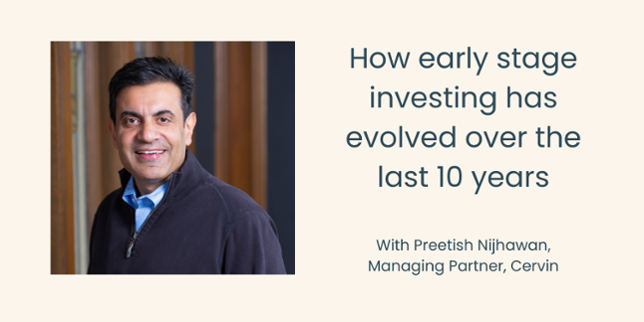
Lorem ipsum dolor sit amet, consectetur adipiscing elit. Maecenas a fringilla tortor, et porttitor tort. Vestibulum non nisi interdum, blandit dolor in. laoreet magna. Suspendisse sit amet elit sit amet nisl. semper imperdiet. Suspendisse
How did you get started in early stage investing?
That's a great question. Actually, I was always a student of technology growing up. And then after I finished my master's here at USC, I joined Intel, and after a few years decided to apply to business school. And while I was there, I was very fortunate to be part of the founding team at a company called Akamai Technologies, which continues to speed the internet, and it's still a public company. After that, I was just in a group of roles, operating executive roles at software companies. And in about 2007-2008. My partner Neeraj and I decided we would start to try our hand at early stage investing. I enjoyed companies in the formative stages or something, I realized less than 100 employees or so. And so we decided to try our hand at early stage investing, put some more of our own money to work, that fund we put together did quite well. And based on that performance, we then raised out, went out and raised our first institutional fund in 2011.
What was the space like when you first started investing and how has it changed over time?
When we started, it was the early days of what we called Seed investing, we just had the bigger venture capital funds, and then you have these smaller Seed funds - Floodgate and Uncork and First Round are coming into play and doing quite well. Since then, there's been a massive proliferation of funds. And now I think there's probably 500 - 600 Seed funds. And even the definition of Seed has changed, right? So Seed is the new way. In the old days, you know, a round was 5 million, now the rounds average 15 million. So I think we've become the new A, funds have increased, and what used to be asked at seed is now Pre-Seed and Mango Seed and all these new phrases. So, you know, I think now the bigger funds also have Seed programs. So the space has become a lot more crowded, but the opportunities have also evolved, you know, proportionately, so I think, while the space has changed, it's still an amazing time to invest. And it's great to see so many great investors trying to invest in the new generation of entrepreneurs.
What do you see as the biggest trends in the space right now?
Yes, there's a whole bunch, actually, it's still a very, very attractive place to invest. I mean, enterprise technologies, if anything, COVID was a tailwind. Companies that are not reliant on technology had to become reliant on the spaces such as cybersecurity, which is the gift that keeps on giving, you know, hackers are always going to be a step ahead, when corporations need to keep up. I think 5G is massive, I think people aren't talking about it enough. For example, the creators of 3G didn't think about the iPhone and the creators of 4G Didn't think about the on demand economy. But clearly, those would not have happened without the 3G and 4G technologies behind that. So you know, the future of 5G, AR/VR, etc. It is massive. And the future of work, right? We all know that, you know, hybrid work is here to stay, it's not going to be like 2020, fully remote, but it's not going to be like 2019 when everybody was mostly at work. So how do you truly collaborate in a Zoom environment? If you will? Can you pull up a whiteboard? How do I really brainstorm ideas in a remote environment? I think developer productivity as you know, software is eating the world. So developers continue to demand more and more tools to make them more productive. And in Data Management, right? The data doubles every nine months. I mean, it's just unbelievable, which means that the data that was generated between the beginning of time and March 2021 is equal to the data that's generated between March 2021 and December of 2021. So the opportunities are actually very attractive and we are very excited.
Where do you see things going in the future?
Well, I think the future, as I had previously mentioned, remains exciting. Things are super hot as we all know right now, whether it's public or private markets, there will be some kind of slowdown in the near future I think, hard for anyone to time it but I would say in the next couple or three years. You know, these people who graduated since 2009, haven't even seen a down market. It will come, guys trust me. But, you know, I think the opportunity set is still so large that we'll continue to see many, many good companies coming out. And great entrepreneurs, you know, creating the next big thing. I think the other trend that I will see is more globalization of enterprise companies, you know, largely they used to be in Europe and some in Israel. We are seeing now you know, unicorns in India. You're going to see companies coming out of Latin America, you know, all over the world. So I think, you know, globalization of entrepreneurship on the enterprise side is here to stay and one of the trends that we think will come to fruition.

We'll send you a nice letter
once per quarter. No spam.

© 2025 Cervin / All rights reserved.